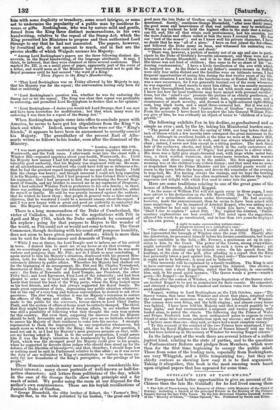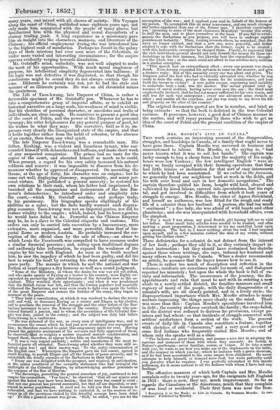GIITZLAFF'S LIFE OF TAOII-RWANG..
FEW Europeans had better opportunities to give an account of the Chinese than the late Mr. Gutzlaff; for he had lived among them • The Life of Taou-kwang, late Emperor of China: with Memoirs of the Court of Peking; including a Sketch of the principal Events in the History of the Chinese Empire during the last Fifty Years. By the late Reverend Charles Gutslaff, Author of the "History of Chins," China Opened," &c. Published by Smith and Elder. many years, ana mixed with all classes of society. His Voyages along the coast of China, published some eighteen years ago, not only made him acquainted with the people of many places, but familiarized him with the physical and moral discomforts of a clumsy trading junk. A long experience as a missionary gave him an insight into the characters manners, and literature of the Chinese ; his official employment during the war introduced him to the highest rank of mandarins. Perhaps no Jesuit in the palmy days of their missions had ever seen more of the Celestials, or under more varied and interesting circumstances ; for the empire appears evidently verging towards dissolution.
3fr. Gutzlaff's mind, unluckily, was not well adapted to make the most of his opportunities. With much moral singleness of purpose, his intellectual simplicity degenerated into baldness; if his logic was not. defective it was disjointed, so that though his conclusions might be sound they do not always contain the rea- sons. Illiterate he certainly was not, yet he had the style and manner of an illiterate person. He was an old chronicler minus the quaintness.
The Life of Taou-kwang, late Emperor of China, is rather a favourable specimen of Mr. Gutzlafl's pen. Whenever he has to take a comprehensive grasp of imperial affairs, or to exhibit an historical narrative on a large scale, his weakness of mind is visible. But his sketches of personal character, or anecdotes and traits of individuals, are clear enough. He contrives to present a good idea of the court of Pekin, and the power of the Emperor for personal tyranny; his utter helplessness for any general purpose of good, let his wishes be what they may. His narrative, bald as it is, im- presses very clearly the disorganized state of the empire, and that it holds together rather from the habit of cohesion, or the absence of an enemy, than from any vital spirit.
The late Emperor Taou-kwang was a remarkable man. His father, Keaking, was a violent and licentious tyrant, who sur- rounded himself with debauchees and buffoons, and made short work of any suspected conspirator. The prince had no taste for the orgies of the court, and absented himself as much as he could. When present, a ,regard for his own safety increased his natural coldness and reserve : it was impossible to discover from his de- meanour whether he approved or disapproved. On ascending the throne, at the age of forty, his character was an enigma; but he came out well, displaying clemency, magnanimity, and many per- sonal virtues. He published- a general amnesty; he restored his own relations to their rank, whom his father had imprisoned; he banished all the companions and instruments of the late Em- peror's debaucheries ; he introduced order and simplicity into the court, which Mr. Gutzlaff ascribes, and perhaps truly, to his parsimony. His biographer speaks slightingly of his abilities as a ruler; but the facts hardly warrant such dispara- ging censures. Taou-kwang was not an imperial genius, nor did he restore vitality to the empire ; which, indeed, had he been a genius, he would have failed to do. Powerful as the Chinese Emperor may be, he is a slave to the Celestial etiquette and customs. His orders can only be carried into execution by a bureaucracy, more extensive, more organized, and more powerful, than that of Im- perial Rome or modern Austria. He probably increased the cor- ruption of the official class by the sale of offices,—an abuse to which Louis the Fourteenth was compelled to have recourse under a similar financial pressure ; and, acting upon traditional dogmas and uniformly false information, he exposed the weakness of the empire by his war with England. As soon as the truth reached him, he saw the impolicy of which he had been guilty, and did his best to repair his fault by retracing his steps and supporting the peace party. The manner in which he met the national and war faction at court argues a dry humour as well as a sound judgment. " Some of the Ministers, in whom the desire for war was not yet stifled, and who spoke openly of Keying as a traitor to his country, were highly ex- asperated on perceiving the altered fortunes of the favourite now iu the as- cendant. They watched their opportunity ; and when it was proclaimed that the British forces had left, and that the Canton populace had manfully withstood the Barbarians, and were even ready to fight over again the battles of the great Emperor and restore the fortune of the army, they began to murmur at the peace.
" They held a consultation, at which it was resolved to declare the treaty null and void, to denounce Keying as a traitor and Elepoo as his abettor, and to proclaim the renewal of the struggle and the utter defeat of the Bar- barians necessary to save the honour of the country. Everybody who con- sidered himself a patriot, and to whom the ascendancy of the Celestial Em- pire was dear, joined in the outcry ; and the subject was duly laid before Taou-kwang in a conference.
" He was sickened of the war, as every man of intelligence was; and to recommence the course which he had just now abandoned was repugnant to him ; he therefore resolved to quiet this sanguinary spirit for ever. Having praised the patriotic sentiments of his servants and fully approved of them, he observed,. that so weighty a matter required mature consideration, and begged them, therefore, to appear before him on the following day.
" It was a very august assembly ; nobles and mandarins of the most in- fluential party all attended. Taou-kwang asked whether they were still re- solved upon war ? and their answer was, To the entire extermination of the English race.' Whereupon the Emperor gave his full assent, agreed to recall Keying, to punish Elepoo and all the fnends of peace severely, and to reestablish the deadly enemies of the Barbarians in their full power. " Every one was delighted with the prospect, and rejoiced, in anticipation, at the entire overthrow of the cowardly statesmen who had betrayed the birthright of the Celestial Empire, by acknowledging another potentate as the compeer of the Son of Heaven:
" The Sovereign, perceiving the general sensation of joy, continued to ha- rangue his counsellors. You know,' he observed, that all our armies sent against the hated race have been beaten ; that the navy has ceased to exist ; that not one general has proved successful, but that all are degraded, or sen- tenced to severe punishment. It need not be told you that the treasury is exhausted, and that we have nothing to replenish it, as the sources of re- venue in all the provinces visited by this dreadful scourge have been dried up.' To this a general assent was given. ' Still,' he added, you are for the resumption of the war ; and I applaud your zeal in behalf of the honour of my person. To accomplish this an army is necessary, and one much stronger and better-appointed than any of the former ones. I therefore commission you' (pointing to some of the most clamorous Ministers) 'to raise this army, to drill the men, and to place yourselves at the head. If you fail to exter- minate the Barbarians as you propose, you will have to undergo capital punishment instantly.' Then, turning towards others, he remarked, that the navy no longer existed, and that a new one, more powerful, and better adapted to cope with the Barbarians than the former, ought to be created ; with this honourable enterprise he charged them. Finally, he requested that the rich individuals present should not only furnish the money for these un- dertakings in the first instance, but likewise bear the expenditure through- out the whole war ; as the state could not afford to lose another sixty millions in a similar enterprise. "This speech had an extraordinary effect : every one present was struck dumb. Taou-kwang requested his servants to come on the morrow, and give a decisive reply. But at this assembly every one was silent and grave. The Emperor asked the first who had so violently advocated war, whether he was ready to form the army, procure the means for its maintenance, and lead forth the troops to victory ? A very polite excuse, expressing total inability to undertake such a task, was the answer. The second pleaded total ig- norance of naval matters, having never even seen the sea ' • the third most emphatically declared, that he had not money sufficient for his own wants, and still less for such vast enterprises ; every one advanced some obstacle or other ; and amidst all the courtiers, not one was ready to lay down his life and property on the altar of the country."
The original documents quoted are few in number, and brief, as being extracts : so that the book is deficient in the true Celestial raciness. It possesses, however, a good deal of Chinese manner in the matter, and will repay perusal by those who wish to get an idea of the court of Pekin and the present condition of the empire of China.



























 Previous page
Previous page